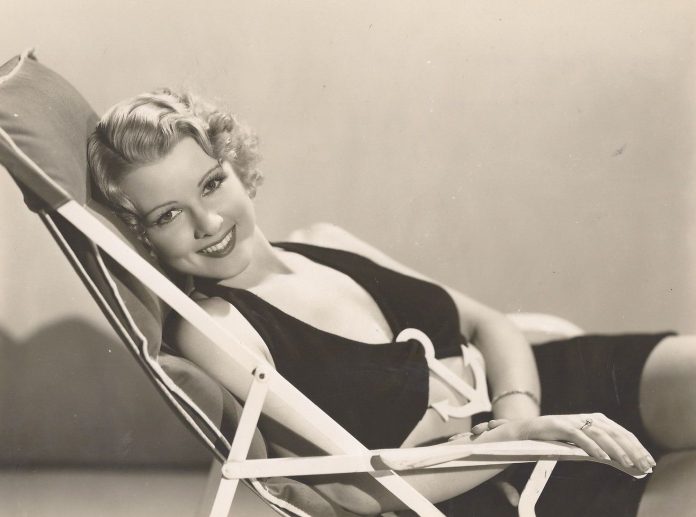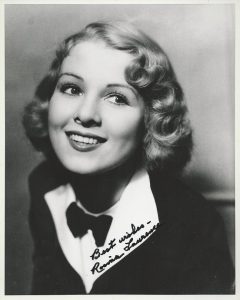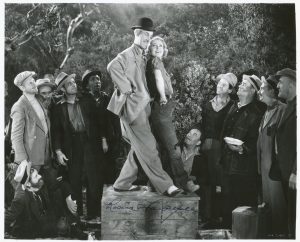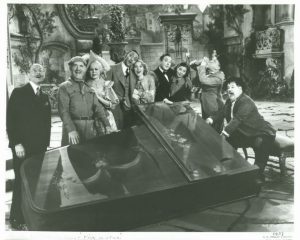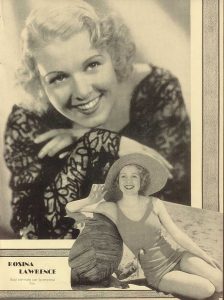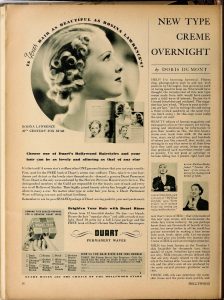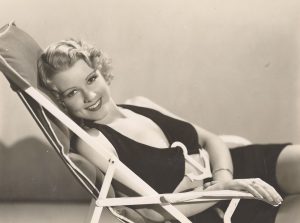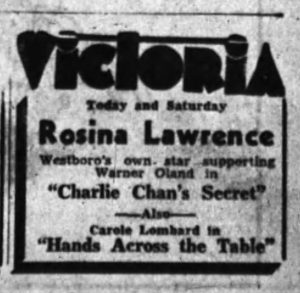By Dave Allston –
The 1930s was an era of depression and lean times, but it was also the golden age of cinema. Perhaps to escape the occasional dreariness of life, residents would flock to the theatre, as movie-houses began appearing in every neighbourhood, including Westboro. However, Westboro in the mid-1930s had a more direct connection to Hollywood, as one of its own briefly became one of Hollywood’s most popular starlets. Her visits back home created a sensation in the neighbourhood, and there was arguably no bigger name locally in the pre-WWII era than that of Miss Rosina Lawrence.
George Lawrence and Annie Hagar married in Ramsgate, England in 1910, and moved to Westboro a year later. Their daughter Rosina was born a year after that, on December 30, 1912. George worked briefly as a streetcar operator, but was a carpenter by trade, and put his skills to work building houses in Westboro. In 1912 he built 350 and 352 Wilmont Avenue, and it is likely in one of these two houses that Rosina was born.
In 1914, he built an impressive brick home at the north end of Roosevelt (342 Roosevelt Ave.) on a large double lot across from the CPR Westboro Station. It was here Rosina spent her early childhood years, attending Westboro Public School (now Churchill) and developing her early swimming skills at Westboro Beach. Annie’s entire family moved close-by; the Hagar name remaining prominent in Westboro for years.
https://www.instagram.com/p/BkipRsTnFs8/?taken-by=kitchissippitimes
In March 1922, when Rosina was nine, the Lawrence family moved to the U.S. for warmer weather and grander opportunities. The family resided in Boston briefly, before arriving in California by the mid-1920s. In Los Angeles, Rosina was signed up for ballet and acting lessons, learning “elocution and stage deportment” under renowned Canadian director, Joseph De Grasse. Meanwhile, George found employment building stage sets at Hollywood studios.
Rosina made her film debut at the age of 11 in “A Lady of Quality” (1924), and appeared in Cecil B. DeMille’s “The Angel of Broadway” (1927). Around this time, Rosina suffered a serious spinal injury from a fall while playing tag at school. Though it was perceived that she was uninjured at first, two weeks later her entire left side was paralyzed. She received extensive medical care over the next year, but it was a revolutionary treatment using dance lessons that returned her to normal health.
During her teen years she worked in vaudeville, stage musicals and film, and as a fashion model in Hollywood. She was also as a stand-in for the popular actress, Sally Eilers, but most of Rosina’s roles were small and uncredited at the time.
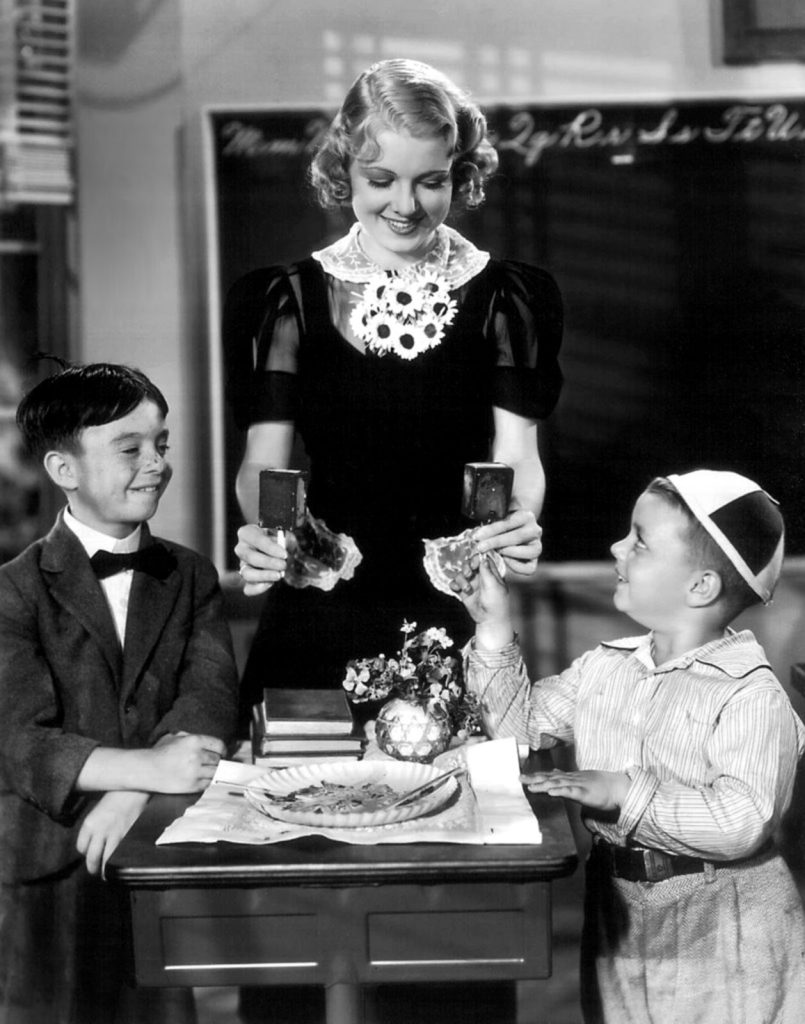
In what was referred to as a Cinderella story for the daughter of a set builder, Rosina got the lead in the 1934 film “$10 raise” opposite Edward Everett Horton. Screened at Ottawa’s Capitol Theatre, Rosina immediately gained a legion of fans. Her performance led to the exciting announcement on May 1, 1935 that she had signed a six-year contract with Fox Studios (which, by the way, paid her as much as $700 per week). This was front page news in Ottawa and her photograph appeared in virtually every major newspaper in North America that day, billed as the “year’s most promising ingénue.” As was common in the era, Rosina was advertised as younger than she was. Two years were shaved off her age.
Fox Studios selected her as one of the “Four Debutante Stars of 1935” who were to be “groomed for stardom.” Also in the group was Margarita Cansino (aka Rita Hayworth), who Rosina had performed with in a dinner club in 1934.
Rosina was 5’3”, blonde with green eyes and had a “clear, firm soprano voice and a trim, graceful figure which would be admirably suited to what is still her greatest ambition – ballet dancing.” She was described as “quiet, almost to the point of being shy, Rosina isn’t the typical wise-cracking, chorus girl type. She seldom dates, does not smoke, and is never seen in Hollywood night spots.” The press called her “one of the prettiest actresses in the motion picture colony.”
Swimming skills, perhaps developed at Westboro Beach, led to her accomplish an impressive feat. She was one of the first women to swim across Lake Tahoe in the Sierra Nevada.
Rosina appeared in five films with Fox. Her contract terminated in 1936 when Fox merged with 20th Century. She was signed by MGM’s Hal Roach Studios, and appeared in “The Great Ziegfeld” and gaining wider popularity as the school teacher in the “Our Gang” series of short films, including the Oscar-winning “Bored of Education” (1936). Her most well-known role was heroine alongside comedians Stan Laurel and Oliver Hardy in “Way Out West” (1937).
At the height of her popularity, Rosina returned to Westboro on several occasions to visit her grandparents and aunts. Neighbourhood children flocked around the Hagar house on Wilmont to catch a glimpse of the famous Hollywood star and get her autograph.
Rosina married New York lawyer, Juvenal Marchisio, in 1939. Following the wedding, she was filming in Italy (where she was extremely popular) when WWII broke out. She had difficulty finding passage home, lucking out in narrowly catching a boat and avoiding capture as a British subject in Germany-allied Italy.
That film was Rosina’s final one, as she retired from show business to focus on her marriage and three children in Brooklyn. Widowed in 1973, Rosina remarried in 1987 to a Laurel & Hardy biographer. She died of cancer on June 23, 1997 in New York City.
Despite her natural beauty and considerable talents Rosina never reached super stardom, but during Westboro (and cinema’s) exciting early days, she was definitely its most famous resident.
Dave Allston is a local historian and the author of The Kitchissippi Museum. His family has lived in Kitchissippi for six generations. Do you have early memories or photos to share? Send your email to stories@kitchissippi.com.
